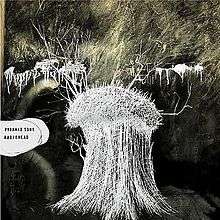Pyramid Song
"Pyramid Song" is a song by the English rock band Radiohead, released as the lead single from their fifth studio album Amnesiac (2001). The song was their first single released in over three years, after none were taken from their previous studio album Kid A (2000).[1] It was issued as Amnesiac's lead single in most parts of the world except in the United States, where "I Might Be Wrong" was the first radio-only single. The song features a string section arranged by Radiohead guitarist Jonny Greenwood and recorded in Dorchester Abbey, a 12-century church about five miles from Radiohead's studio in Oxfordshire.[1] It was inspired by the Charlie Mingus song "Freedom;[2] its lyrics were inspired by an exhibition of ancient Egyptian underworld art Yorke attended while the band was recording in Copenhagen[3] and ideas of cyclical time discussed by Stephen Hawking and Buddhism.[3] Drummer Phil Selway said the song "ran counter to what had come before in Radiohead in lots of ways ... The constituent parts are all quite simple, but I think the way that they then blend gives real depth to the song."[4] In a 2001 interview with David Fricke in Rolling Stone magazine, guitarist Ed O'Brien said he felt it was "the best song we've recorded."[1]
"Pyramid Song" peaked at #5 on the UK Singles Chart, and NME named it their "single of the week".[5] Rolling Stone placed it at number 94 on their list of the "100 Best Songs of the Decade".[6] In October 2011, NME placed the song at number 131 on its list "150 Best Tracks of the Past 15 Years".[7] Pitchfork Media place it at number 59 in its list of the "Top 500 Tracks of the 2000s".[8]
Track listing
- UK CD1 (CDSFHEIT 45102)
- "Pyramid Song" – 4:51
- "The Amazing Sounds of Orgy" – 3:38
- "Trans-Atlantic Drawl" – 3:02
|
|
- UK CD2 (CDFHEIT 45102)
- "Pyramid Song" – 4:51
- "Fast-Track" – 3:17
- "Kinetic" – 4:06
| |
- UK 12" (12FHEIT 45102)
- "Pyramid Song" – 4:51
- "Fast-Track" – 3:17
- "The Amazing Sounds of Orgy" – 3:38
| |
- Europe CD (7243 8 79357 2 3)
- "Pyramid Song" – 4:51
- "The Amazing Sounds of Orgy" – 3:38
- "Trans-Atlantic Drawl" – 3:02
- "Kinetic" – 4:06
| |
- Japan CD (TOCP-61053)
- "Pyramid Song" – 4:51
- "Fast-Track" – 3:19
- "The Amazing Sounds of Orgy" – 3:38
- "Trans-Atlantic Drawl" – 3:03
- "Kinetic" – 4:05
|
Personnel
Charts
References
External links
|
|---|
|
|
|
| Studio albums | |
|---|
|
| EPs | |
|---|
|
| Other albums | |
|---|
|
| Singles | | Pablo Honey | |
|---|
| | The Bends | |
|---|
| | OK Computer | |
|---|
| | Amnesiac | |
|---|
| | Hail to the Thief | |
|---|
| | In Rainbows | |
|---|
| | A Moon Shaped Pool | |
|---|
| | Non-album | |
|---|
|
|---|
|
| Other songs | |
|---|
|
| Videos | |
|---|
|
| Related | | Albums and EPs | |
|---|
| | Personnel | |
|---|
| | Other | |
|---|
|
|---|
|
-
 Book:Radiohead Book:Radiohead
-
 Category:Radiohead Category:Radiohead
-
 Portal:Alternative rock Portal:Alternative rock
|
